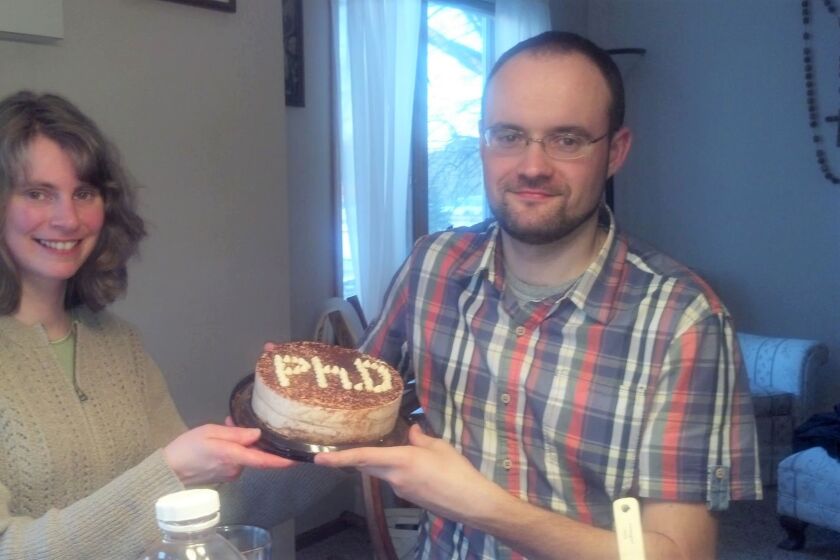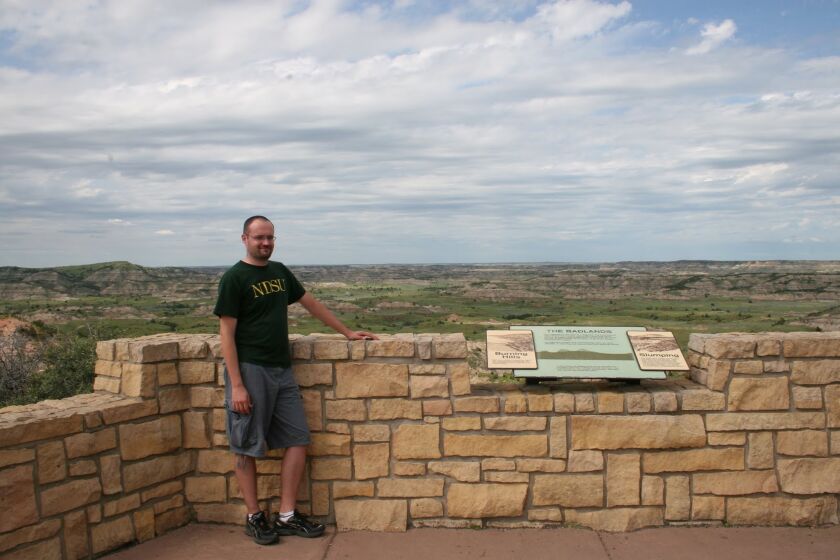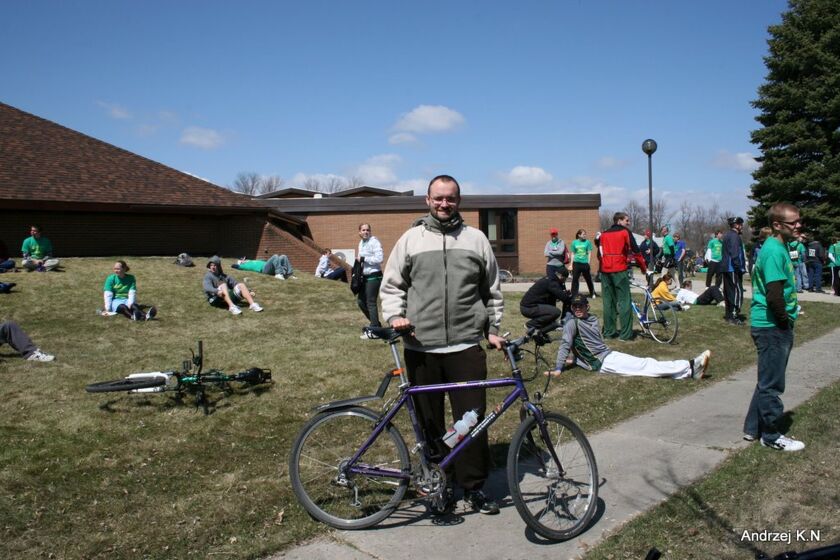
FARGO — Before his first airplane flight at 22, Andrzej Noyszewski’s international traveling experience was limited to hikes with his parents as a youngster in the Polish mountains, when they crossed briefly over the border between Poland and then-Czechoslovakia.
Years later, in 2004, when an opportunity came to visit the United States to explore wheat science, the molecular biologist welcomed the adventure.
“It felt like I was literally flying,” he says of crossing the ocean into North America, destination University of Riverside in California.
During those four months, he flew again, this time to Fargo for a few days to meet a professor at North Dakota State University with common interests. Later, after finishing his master’s in biotechnology in Poland, he returned here to pursue his doctorate in genomics and bioinformatics.
Now a U.S. citizen, Noyszewski has been back to Poland to see his family only four times in 16 years.
“Through the eyes of faith, even this is not my destination,” he says, hinting at a hoped-for heaven.

Finding community
Soon after arriving in Fargo with only two bags of belongings, Noyszewski found himself sleeping on the floor of a fellow student’s apartment until securing a place of his own.
“My first bed was a used mattress, and all my furniture was given to me by friends,” he says, mentioning one of his first purchases, a $90 Trek bicycle, “the best bike I’ve ever had.”
At Mass, he crossed paths with Melissa Huhn, “the very first person to help me get around the city.”
Now a religious sister with the Franciscan community in Hankinson, N.D., Sister Mary Ruth, a fellow doctoral student who shared a lab with Noyszewski, remembers him as an “efficient and precise” scientist.
During monotonous work, they’d discussed their faith. “I find myself drawing a lot of connections between the spiritual life and plant growth and genetics,” she says, noting how the soybean emerges from the earth “bent and bowing down,” as if in homage to God.
She also accompanied Noyszewski on his first trip back to Poland, meeting his family and visiting religious sites. “We also rode bike together, went on walks… and I even learned some of the Polish traditions.”
Newman Center nexus
The Rev. James Cheney, chaplain of NDSU’s Newman Center, recalls Noyszewski as a student deeply devoted to his studies and God. “His faith was something he never compromised,and that’s ki nd of rare in some ways right now.”
Noyszewski appreciated the $1 potluck dinners at the center on Sunday nights, where he could “hang out, have food and enjoy the company,” along with other social events, including bike rides, movie nights and camping trips.

More recently, Cheney encouraged him to apply to Agathos Biologics, where Noyszewski works on developing morally-sound stem cell lines for pharmaceutical use.
Noyszewski also met his wife, Lynette, through the Newman Center. But he reached out beyond the Catholic community, too, cooking at the Dorothy Day House, and hosting several Christmas dinners, inviting friends who were Muslim, Hindu and atheist.
“Everyone was happy despite the different faiths,” he says. “We all celebrated together.”
Tanks in the streets
Despite the welcoming experiences, some aspects of life here have confounded Noyszewski — especially in recent years. While serving on a diversity and equality committee at the University of Minnesota, he says, a colleague insisted he’d procured his university position through “white privilege.”
“The only privilege I’ve had has been hard-working and faithful parents, but I would call that a blessing,” he says, noting that his status being labeled otherwise “erases how much work my parents put into me, and other people involved in my life.”
This begs reflection on Noyszewski’s beginnings. Born in Warsaw, Poland, in 1981, his origins were circled by communism, including the presence of military tanks and martial law.
“Despite the whole madness of that time, my parents did what they needed to do to get an education and establish a family,” he says. “They taught me hard work and personal responsibility despite what’s happening around you. That’s my privilege.”
Noyszewski shares that his father, an electrical engineer, biked to work 5 miles each way for a period, and despite his mother’s job as a dentist, they couldn’t afford a plane ticket for his trip abroad.
He recalls going to the store with his mother on his sixth birthday, and her presenting the salesperson with her rations card for butter. She then encouraged him to choose a gift from an almost-bare display case. “There was hardly anything,” he says.
Earlier, he recalls his father feeding his sister some baby food sent from the United States. As wind kicked up, sand got into the jar. His father scooped out the sand and ate it before offering the rest to his child.
His elementary school had one sink and no indoor bathroom, Noyszewski says; only an outhouse without a door shared with several hundred students. They were forced to learn Russian, and his parents had no choice in their assigned occupations.
“There were food stamps, too, and, who has a car anyway?” he adds. “Despite all of that… I never felt a victim of the system where I grew up.”
Similar patterns in our country now concern him, he says.
“The more laws in place to govern day-to-day life, the more we’ll experience loss of personal freedom, and the more communist-like state we will have.”
Faith origins
But with faith, all can be overcome, Noyszewski says, adding that 90% of Poland is Catholic. Growing up, he recalls regular Mass attendance, spending much time at their parish, and solid values.
“My parents basically said, ‘You know what’s right, and you do it, despite everybody else,’” he says. “You change the system if you can… but don’t blame someone else for your failures.”
Just a few years after Noyszewski’s birth, a Polish priest, the Rev. Jerzy Popiełuszko, was murdered by three members of the security service. Popiełuszko had become an outspoken voice for the Solidarity trade union, comprising millions of laborers resisting communism’s heavy hand.
An aunt lived near the priest’s grave in Warsaw, Noyszewski says, and they visited the site often.
“But I think John Paul II was even more influential on my personal growth as a teenager and young adult.”
He’s tried living by the former pope’s pronouncement: “You must demand of yourself, even if others would not.”
Noyszewski has noticed something special about Christians here.
“Maybe it’s because, in a communist environment, people had to hide faith a lot; there are consequences of being Catholic or Christian openly,” he says. “People here are more expressive, and really live their faith.”
No contradiction with science
Noyszewski expresses gratitude for the opportunities offered him here, saying he would never ask for anything for free. He’s also thankful for his work as a scientist, finding no contradiction with his faith.
“I approach my faith through the perspective of science, trying to find reasons for everything,” he says.
Noyszewski says the choices he makes are determined by his faith. For example, early on, he chose plants as a specialization to avoid work that could be immoral. At Agathos, however, he’s now circled back to pursuing science affecting human beings directly, ensuring, for example, that abortion never enters into their research.
“How my faith impacts science, this comes through diligence, honesty, recordkeeping and the pursuit for truth versus opinion,” he says. “Results are results; this is a fact.”
Noyszewski says he did confront a faith dilemma, not in questioning God’s existence but wondering about God’s caring after being denied a petition to become a deacon in the Church.
“It was a time when I could not hear God,” he says, and “prayers seemed very one-sided.” The silence confused him. “For most of my life I felt that God was literally screaming at me, telling me, ‘I’m here!’” through nature.
“What broke that confusion was that I realized it was my choice to believe,” he continues. “It’s a choice, an act of faith.”
He encourages anyone frustrated by exterior circumstances to “keep doing good work, keep your values despite everybody else around you, and remember that the destination is more important than anything you are doing right now.”
[For the sake of having a repository for my newspaper columns and articles, I reprint them here, with permission, a week after their run date. The preceding ran in The Forum newspaper on June 10, 2022.]

Leave a Reply